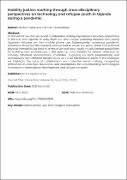| dc.contributor.author | Clarke, Rachel | |
| dc.contributor.author | Tukundane, Cuthbert | |
| dc.date.accessioned | 2024-05-01T22:08:23Z | |
| dc.date.available | 2024-05-01T22:08:23Z | |
| dc.date.issued | 2021-03-03 | |
| dc.identifier.issn | 1072-5520 | |
| dc.identifier.issn | 1558-3449 (Online) | |
| dc.identifier.uri | https://doi.org/10.1145/3447944 | |
| dc.identifier.uri | http://hdl.handle.net/20.500.12280/3158 | |
| dc.description.abstract | In this article we discuss recent collaborative writing experiences between researchers in the U.K. and Uganda. In early 2020, our team began planning research with young Ugandan refugees on their mobile phone use. Subsequently, numerous pandemic lockdowns thwarted this research and we had to revise our plans. While this enforced physical immobility (at least in terms of air and road travel) initially limited possibilities for building new partnerships, it did open up opportunities for deeper reflection on critically informed sociotechnical mobilities, engaging us both pragmatically and conceptually with different disciplines as part of an international team. In this dialogue, we highlight the value of collaboration and collective sense making, recognizing differences in expertise, disciplines, and orientations, for understanding technological innovation in international development and refugee contexts. | en_US |
| dc.language.iso | en | en_US |
| dc.publisher | ACM DIgital Library | en_US |
| dc.relation.ispartofseries | Interaction;Volume 28, Issue 2, Pg. 28-33 | |
| dc.subject | Mobile phone use | en_US |
| dc.subject | Technological innovation | en_US |
| dc.title | Mobility justice: working through cross-disciplinary perspectives on technology and refugee youth in Uganda during a pandemic | en_US |
| dc.type | Article | en_US |


